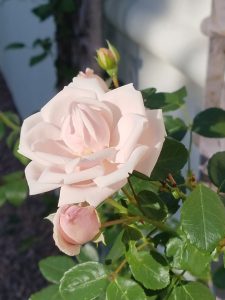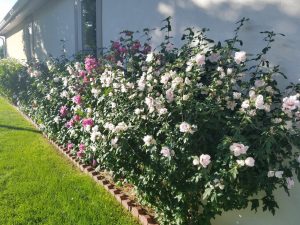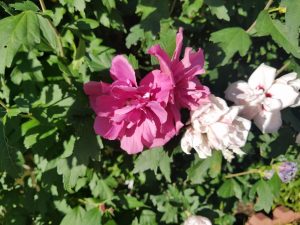 Why is it that September roses seem more beautiful than those of June? Maybe it’s because we thought we’d seen the last of the blossoms, but then the rose bush surprises us with a new burst. Just a little plant food, water, and sunshine and voila! Another showing of delicate pink buds appears to remind us that warm, summer days are still with us, and beauty will continue to appear where we least expect it.
Why is it that September roses seem more beautiful than those of June? Maybe it’s because we thought we’d seen the last of the blossoms, but then the rose bush surprises us with a new burst. Just a little plant food, water, and sunshine and voila! Another showing of delicate pink buds appears to remind us that warm, summer days are still with us, and beauty will continue to appear where we least expect it.
My rose bush is a common rambler, but my neighbor has a glorious hedgerow of Rose of Sharon bushes. Really from the hibiscus family, these blooms wait until late August or early September to come into their glory. In the Bible, the Rose of Sharon symbolizes beauty, and it is used in the poetic book of Song of Solomon to describe the beauty of a lover. This year we were all surprised when a darker pink section appeared in a bush that was always covered with light pink flowers in years past. Some sort of beautiful, botanical miracle!
 At our last house, I had a more sophisticated rose that only had two or three blossoms at a time. Still, each year in September it would gather all the nutrients it had left to produce one perfect rose which I always dubbed “the last rose of summer.” I’m not the only one to appreciate such simple solitude. In 1830, Thomas Moore wrote, “’Tis the last rose of summer, left blooming alone; All her lovely companions are faded and gone.”
At our last house, I had a more sophisticated rose that only had two or three blossoms at a time. Still, each year in September it would gather all the nutrients it had left to produce one perfect rose which I always dubbed “the last rose of summer.” I’m not the only one to appreciate such simple solitude. In 1830, Thomas Moore wrote, “’Tis the last rose of summer, left blooming alone; All her lovely companions are faded and gone.”
What lesson does the late or last September rose have for us? Maybe it’s a sign that whatever our age we, too, have more to offer the world than we have yet revealed—even more than the world expects of us. If summer has rejuvenated us at all, can we pull on the resources we’ve stored up to go into fall producing something that makes the world a more beautiful, better place?
I must have loved going back to school in the fall as a child, because September always gives me a boost. It feels more like a new year than January 1 ever did! It’s a time to set goals, to mend any fences with broken pickets, to look forward to the coming autumn, even winter, with an expectation that the days will be worth celebrating just because they exist.
Might there be hard times to come? Sure. The farmer’s almanac predicts a cold and blustery winter. But as we are surviving it, the rose bush buried under the snow will be resting up for a new show of glory come next summer. That wise sage Ziggy is quoted as saying, “You can complain because roses have thorns, or you can rejoice because thorns have roses.” Let’s enjoy the last rose of summer, applaud her resilience, and be optimistic about the beauty in the days to come—even if there are some thorns, too.
